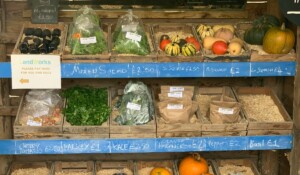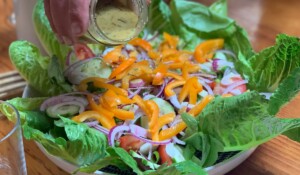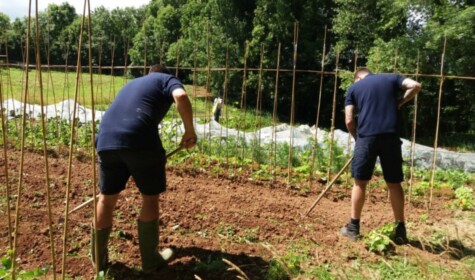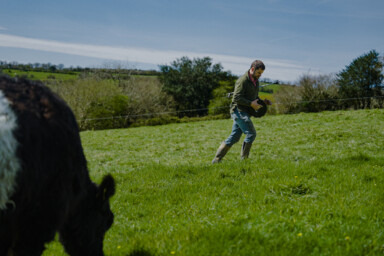Launched in 2013, LandWorks is an award-winning independent charity based in Devon, providing a support route back into employment and the community for people in prison or at risk of going to prison. Here, LandWorks market gardener, Monika Kroll, reflects upon the transformative power of growing, cooking and sharing food together.
Alongside woodwork and arts and crafts, LandWorks’ thriving market garden forms an integral part of our working day. Together, these activities serve to build vital employment and social skills, increasing self-worth and encouraging personal responsibility. Our team at LandWorks also provide ongoing support for the ‘trainees’ with issues such as housing, finances and substance misuse.
The market garden is run on organic and permaculture principles and trainees, encouraged by the head market gardener, are involved in every part of the growing process: from ground preparation to sowing seeds and nurturing their growth, to harvesting the fruit and vegetables. These are sold at the field-gate shop and used in the LandWorks kitchen, where they form the foundation of the meals cooked by trainees with support from our chef.
Trainee Robin says, “Since being here I’ve been working on the veg patch, harvesting veg, which is pretty cool and interesting. I’ve learnt quite a few things… harvesting different things… like kale and stuff, knowing where to cut it. I’ve never done that before.”

Recent funding has enabled us to employ a chef for three days a week to deliver food education, cookery training and one-to-one sessions with trainees. These have been a great success, helping to improve trainees’ confidence in cooking nutritious and healthy food, but also by developing a closer link between the garden and the kitchen, fostering the connection between seed and plate. This process of enabling people to experience the joy of growing their own food and seeing it thrive has become a key aspect of the LandWorks project. “The gardening has been a highlight,” says Jeremy, another of the trainees.
Tony remarks, “I’ve never really worked outside. I’ve always worked inside… it’s nice… I like it… with the veg I know what to do to maintain it, get it to grow, harvest it, bag it up, take it out… Yeah, I think I prefer outdoors. I think this has showed me something I can actually do and enjoy.”
The market garden is a powerful tool for supporting the connection with the outdoors and nature, and it has obvious impacts on the mental and physical health of trainees. Dave reflects, “When you’re here, it’s lovely. It’s better than what I thought it was. I love the countryside… birds, countryside, the animals, it’s in the middle of nowhere and it’s nice. It’s quiet and I like that: peace and quiet.”
The communal lunches at LandWorks have always been at the heart of the project. The four recommendations on ‘Food’ from the HM Inspectorate of Prisons (July 2016), were for prisoners to be provided with ‘good’ nutritional food, facilities to enable eating together, self-catering/cooking opportunities and to eat at ‘normal’ times of the day. The benefits of preparing, cooking and sharing good food with others has also recently been examined through research carried out here at LandWorks. The research focus was ‘commensality’ (eating together) as a tool for health, wellbeing, social inclusion and community resilience.
Another trainee, Benjy, astutely notes, “I can see people come here having a bad day, get here, get the boots on, by the time they’ve had something to eat, they’re smiling. Do you know what I mean? So yeah, it’s like a little family thing. It’s good. It’s decent.”
These shared lunches encourage social inclusion and help trainees develop social skills and tastes in food they might not otherwise experience. The lunches work by introducing people to the scheme and enabling the wider community to socialise with trainees, as John notes: “I suppose it’s the people as well, isn’t it? That’s a big part of it: people that are about, everybody that’s about, different walks of life – that makes it very interesting actually…”

However, the main thing for the trainees is the opportunity it affords them to show themselves in a good light. For successful resettlement to work, trainees need to feel accepted and that they can move on. So, eating together works both ways; it can be an eye-opener for visitors and enables trainees to engage in ‘normal’ (non-prison) activities, conversations and to “mix with normal people” as Nolan puts it. This becomes part of a normalising process, of “not feeling like a prisoner” and “learning to be with people”. It is ‘civilising’ as well, as Alex says, “I was trying to be polite and civil and stuff like that,” and John, “It always makes you mind your Ps and Qs.”
Most trainees comment that “it’s just nice to talk to people”. Bradley shares that, at lunchtimes, “conversations just fly about, that’s what I like about it – you get to speak to everyone”, whilst Frank says lunchtimes are all about “just eating, everyone just talks, interacts, has general chitchat really”. As Nolan puts it, “You don’t feel like a prisoner out here… coming out here makes me normal, I am mixing with normal people again.”
From the perspective of regular lunchtime visitors, eating together in a relaxed environment is an opportunity to witness a transformation in the trainees as they “re-establish themselves from within,” as Donald, a volunteer, describes it. Rather than the prison approach of head down and no eye contact, at LandWorks lunchtime gives everyone a chance for real, unguarded connection and the opportunity to talk openly on far-ranging subjects, breaking down perceived barriers and reaffirming our shared humanity.
Growing, cooking and sharing food forms the bedrock of the LandWorks philosophy. All these activities underpin our work to build trainees’ self-worth, confidence and responsibility, so that they can lead independent lives after their placement with us.
To find out about the Sustainable Food Trust’s work to link education in prisons with horticulture and gardening, visit our Greener Prisons project page. You can also read more about LandWorks in this article by our Head of Projects, Bonnie Welch.
Featured photos courtesy of LandWorks.







